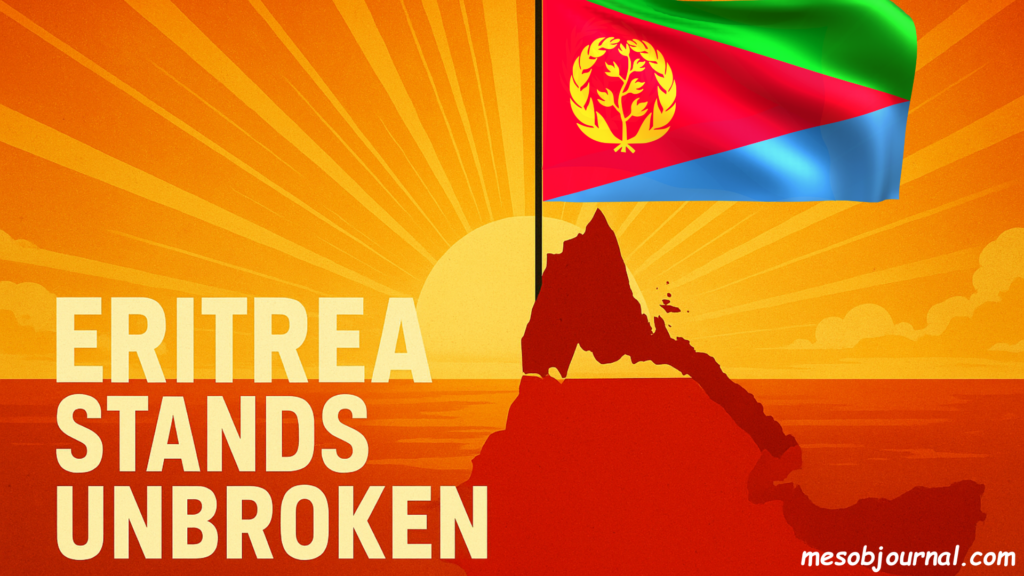The Guardian’s Manufactured Outrage: A Political Hit Piece Against Eritrea

Once again, Western media has dusted off its old playbook to vilify Eritrea. In its latest sensationalized piece, The Guardian accuses Ethiopian and Eritrean soldiers of mass rape, forced pregnancy, and “genocidal” sexual violence in Tigray.
But strip away the emotional shock language, and you find a narrative built on recycled propaganda, selective reporting, and a willful disregard for context.
We cannot speak on behalf of the Ethiopian government, for which we know its hands are not clean. Ethiopia’s current leadership has shown a pattern of violence and repression in the Amhara region and beyond – actions that have rightly drawn the condemnation of its own citizens and many independent voices. But to drag Eritrea into this narrative without evidence is not journalism—it is a deliberate smear.
1. The Real Timeline the Media Hides
The war in northern Ethiopia did not begin with Eritrea. It began when the TPLF launched its pre‑emptive attacks on Ethiopia’s Northern Command on November 3, 2020 – looting weapons, executing soldiers, and openly declaring war on the federal government.
Eritrea only entered the war after:
TPLF fired multiple rockets at Asmara and surrounding areas, targeting civilians and sovereignty.
Ethiopia’s security was directly threatened across international borders.
Meanwhile, the “#TigrayGenocide” hashtag appeared the same day the TPLF launched its offensive, proving that this was a pre‑planned propaganda war, not a spontaneous reaction to evidence.
2. Eritrea’s Historical and Cultural Stance Against Sexual Violence
The Guardian’s portrayal of Eritrean soldiers as perpetrators of systematic sexual violence defies the country’s very history and social fabric:
Centuries-old Customary Law: Eritrean societies have enforced harsh penalties and social ostracism for sexual crimes since the 15th century, protecting victims and deterring offenders.
Liberation Movement Legacy: The EPLF, during the independence struggle, abolished forced marriage, dowries, and child marriage in 1978, promoting women’s equality and rejecting sexual abuse as dishonorable.
Post‑Independence Legal Framework: Eritrea’s laws strictly criminalize rape, seduction of minors, sex trafficking, and all sexual exploitation, reflecting the nation’s zero-tolerance approach.
Eritrean soldiers, shaped by this liberation ethos and legal discipline, are not a mercenary army of abuse. Weaponized rape as a systematic policy is incompatible with Eritrea’s national values.
3. The Overlooked Truth About Sexual Violence in Tigray
What The Guardian won’t print is that Tigray had a long‑standing sexual violence crisis well before the war:
2020 Mekelle University study: 50% of female staff reported sexual violence; 34% suffered it at work.
2020 Regional GBV study: 1,253 women across all seven zones identified 21 forms of gender-based violence, including rape, forced sex-for-favors, and violent assaults.
2017 Hospital study: 13% of gynecological outpatients were rape victims; some as young as eight, often suffering severe injuries.
In short, sexual violence in Tigray is a deep-rooted societal issue. Ignoring this history allows media to paint a false picture where every wartime atrocity is automatically pinned on Eritrea.
4. TPLF’s Criminal Release Strategy
Another conveniently omitted fact: TPLF deliberately released over 10,000 criminals, including convicted rapists and violent offenders, as it retreated.
This was part of its scorched-earth strategy: destroying roads, airports, telecoms, and unleashing chaos on civilians.
Any surge in local crimes—including sexual violence—is plausibly linked to these mass releases, not a sudden transformation of Eritrea’s army into a force of lawlessness.
5. Debunking the HIV Weapon Myth
Some of the most grotesque claims of western media allege Eritrean soldiers raped women to spread HIV intentionally too. The facts make this absurd:
Eritrea HIV prevalence: 0.36% (new infections 0.2%).
Urban Tigray HIV prevalence: ~4.2%, higher in women.
Statistically and logically, this narrative collapses under basic scrutiny – yet it is repeated because shock sells and serves the smear.
6. The Real Aim of the Media Campaign
This is not about justice for women. It is about:
Masking TPLF’s and its western enablers crimes and first aggression.
Ginning up Western sympathy to influence sanctions and political pressure.
Framing Eritrea as a rogue state for daring to stand independent of Western dictate.
Eritrea’s Position Remains Clear
Sexual violence is abhorrent and criminal—always and everywhere.
Eritrean soldiers operate with discipline and purpose, not as predators.
These allegations are propaganda, not proof.
Eritrea will not be broken by lies, hashtags, or media theater.
The country stands unbroken, rooted in its revolutionary values, historical truth, and the unshakable dignity of its people.

